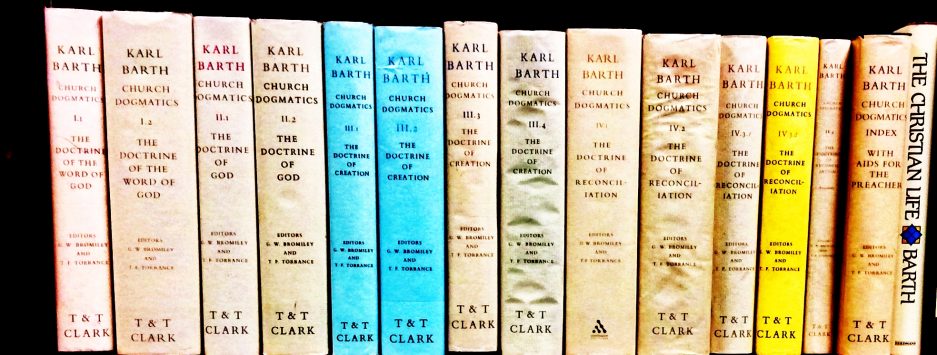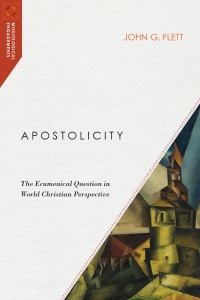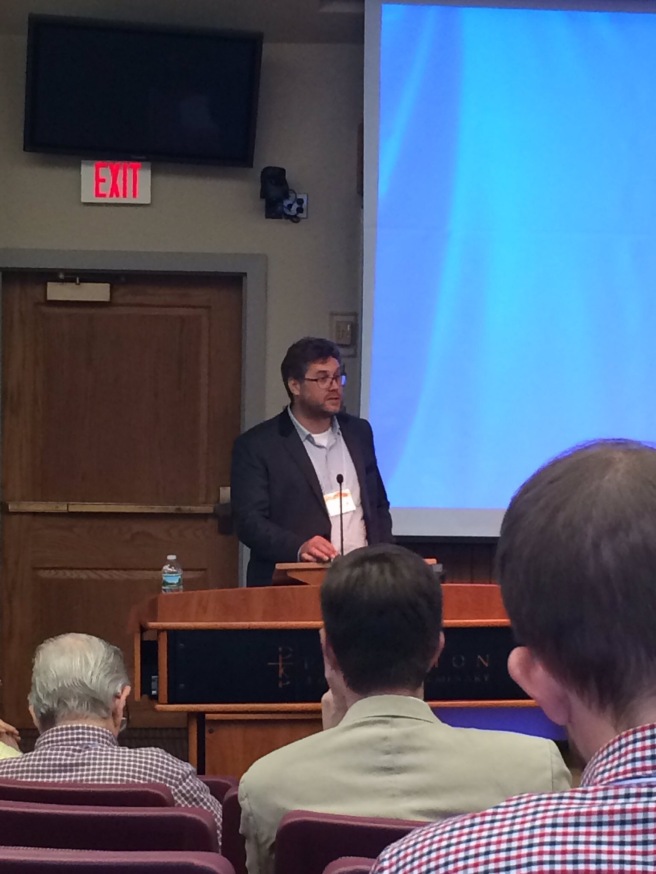Dr. John Flett, author of a newly released book on Apostolicity, began his lecture (June 20, 2016) by noting that the practices of exorcism and healing are “key missional activities and issues in today’s world.” With over 25% of world Christianity self-identifying within the Pentecostal tradition, and with the practices of exorcism and healing taking place in regular and daily occurences in the Asian, African, and Latin American context (i.e., the churches in the global south), to avoid these issues is “theologically irresponsible.”
Karl Barth on the Demonic and the Lordless Powers
Flett approached the topic by expounding first on Karl Barth’s account of evil and the demonic. In this, Flett paid special attention to Barth’s concept of the Nothingness (Das Nichtige) and his account of the “lordless powers.” In short, Flett argued that Barth refused to accept the binary situation in which we find ourselves when speaking of the demonic. That is, it is often assumed that one can only either deny the demonic on the one hand, or to pay too much attention to the demonic on the other hand. But to think about the demonic in either of these ways is to pose false alternatives, both of which give the demonic the “power” is does not merit. To ignore the demonic is to leave it unfettered in its opposition to God’s ways; to pay too much attention to it is to give it the power it does note merit. In this regard, Barth counsels that Christians accept the biblical realism of the demonic, to give the demonic a theological account, but to give an account which does not place emphasis on the demonic itself, but only as understood under the Lordship of Jesus Christ. Whatever the case, Barth is concerned that too wrong thinking about the demonic is to fundamentally to misunderstand the essential nature of the demonic as “falsehood.” Nevertheless, Barth feels need to give account, even with “just a glance”!
Flett summarized the main points of Barth’s demonology as follows:
- The demonic has a form of existence, but not in the form of personal agents of evil.
- The demonic exists as “Nothingness” and “falsehood”; it is anything which sets itself up against the “Yes” of God.
- The demonic is the “false mimicry” of the truth of God; therefore the demonic is not “real” in the sense of participating in the truth of God, but the “demonic is not nothing.”
- Barth differentiates between the demonic and the “lordless powers” spoken of in the NT–powers which are “real and efficacious” in a way that demonic Nothingness is not.
- Because Barth believes that the demonic and lordless powers work in the created order, he believes that demonic possession (in the sense that one can be “demonized” and fall under the illusions of falsehood) is possible, but that exorcism (which Barth assumed to require only under a concept of demons as agents) is not possible.
Amos Yong on Healing and Exorcism in Pentecostalism and the Churches of the Global South
Flett turned secondly to examine Amos Yong’ account of healing and exorcism as one working from a Pentecostal perspective. Yong believes that demonology is a central factor of how the Gospel is proclaimed and received in most of the non-western cultures in the world. In this regard, Pentecostalism, as a world movement is received as a religion of salvation (read: liberation, though not liberation in a neo-Marxist sense, but in the sense of real release from demonic oppresssion) in a world inhabited by spirits and demons in largely non-western cultures (i.e., the Global South). Indeed, Yong asserts:
Human experience exclusive of the demonic remains impoverished.
That is to say, those who have not come to grips with the reality of the demonic have not yet understood the salvation and liberation which Christ came to give.
Yong seeks to develop an “ontology of the demonic”. For Yong, the demonic arises out of the natural evolutionary processes of the world, but they are also not merely “material” in nature. Yong also acknowledges that demons are real, but with Barth, is somewhat hesitant, but certainly more open, to seeing them necessarily as personal agents.
Furthermore, Yong insists that the notion of exorcism, while certainly possible, has tended to highlight the activity of the demonic only as “individual and episodic” to the exclusion of demonic activity as “ongoing and communal.” In this regard, Yong argues that true “exorcism” is the process of carving out space both individually and communally to renounce the powers of evil in both cosmos and in intergenerational communities. This is accomplished as the Church gathers in public worship and liturgy, confession, baptism, etc., but also in the working of the church in the sphere of political, ethical, legal and social contexts where the demonic still holds sway. In short, Yong accepts the possiblity and need for exorcism and that this is entirely possible at an individual level, but that individual exorcism must not be allowed to overshadow the larger communal context in which the lordless powers need to be exorcised from the community.
Barth and Yong in Conversation
Flett concluded his paper by highlighting some of the similarities and differences between Barth and Yong.
For both Barth and Yong:
- Too much focus on the demonic can itself become a demonic form of activity itself
- The demonic powers are overcome only through participation in Jesus’ kingly victory, not through personal or ecclesial efforts or rites
- The demonic has real/efficacious effects in the world and a cosmology that overlooks the demonic has fallen either to a form of reductionism or naturalism
However, Barth and Yong differ in the following:
- Barth refuses to give the demonic personal (agential) status; Yong is more open to the “personal” nature of the demonic, as is evident in the practices of world Pentecostalism
- Barth refuses to allow for exorcism precisely because it presumes the demon as a personal agent (though Barth appears also to ignore scriptural evidence that seems to point plainly in this direction; Yong allows for exorcism, but with Barth is nervous about focusing too much on exorcism as an individual practice in favor of more corporate practices of ongoing renunciation of the demonic in corporate life of prayer, confession, baptism, etc.



This was very interesting to read since the demonic and healing were and are very integral features of the cultures we lived in. Gave me some good things to consider. Thanks, Carl